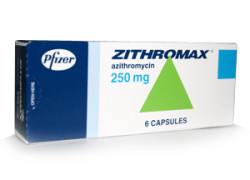Top Class Actions’s website and social media posts use affiliate links. If you make a purchase using such links, we may receive a commission, but it will not result in any additional charges to you. Please review our Affiliate Link Disclosure for more information.

While it is common for antibiotics like Zithromax to carry with them a risk of allergic reactions, the link between Stevens Johnson Syndrome and Zithromax is more serious than usual. In most cases, allergic reactions to antibiotics are mild and go away on their own.
Zithromax users who develop Stevens Johnson Syndrome, however, may be at a serious risk.
If you or someone you love is taking Zithromax, you should be cautious of any allergic reaction that occurs, even if it seems mild.
A mild skin rash will likely go away quickly and painlessly, but may instead develop into the life-threatening Stevens Johnson Syndrome rash.
For most antibiotic reactions, treatment is unnecessary. If further treatment is required, a patient usually is simply taken off the antibiotic until the reaction subsides.
Stevens Johnson Syndrome and Zithromax
Unfortunately, while most Zithromax users experience only minor side effects, some instead develop Stevens Johnson Syndrome, a life-threatening, painful skin condition that requires immediate medical attention.
Stevens Johnson Syndrome attacks a Zithromax user’s skin and mucous membranes.
Though it generally starts out as a small rash, Stevens Johnson Syndrome can rapidly spread to cover large portions of a person’s body. This is both very painful and very dangerous.
Indeed, skin rashes from Stevens Johnson Syndrome can be so severe that they begin to resemble burns. This is why, for many Stevens Johnson Syndrome patients, their rashes are treated in a hospital’s burn unit.
As Stevens Johnson Syndrome begins to develop, the rash generally turns purple or red, and spreads rapidly across the skin. Soon after, the rash begins to blister and peel dramatically. This is quite painful.
If what you’ve believed to be a mild skin rash becomes painful or spreads rapidly, seek medical attention immediately.
While Stevens Johnson Syndrome is serious enough, it can develop into a more severe version of itself known as Toxic Epidermal Necrolysis, or TEN.
This occurs when the Stevens Johnson Syndrome rash spreads to cover over 30 percent of a patient’s skin. Recognizing TEN is simply a way of noting that the severity of the condition has increased.
Indeed, the mortality rate for Stevens Johnson Syndrome patients is 5 percent, while the mortality rate of patients diagnosed with Toxic Epidermal Necrolysis increases to 40 percent.
After reports linking Stevens Johnson Syndrome and Zithromax began to spread, the U.S. Food and Drug Administration (FDA) asked that Pfizer Inc., the manufacturer of Zithromax, include a warning label about the risk of Stevens Johnson Syndrome associated with the drug.
Zithromax SJS Lawsuits
A number of injured patients have filed Zithromax lawsuits against Pfizer Inc. These lawsuits allege that the manufacturer knew about the life-threatening link between Stevens Johnson Syndrome and Zithromax, but chose to deliberately downplay the severity of these side effects.
Instead of warning the public and the medical community about these serious risks, the company allegedly over-marketed the drug as safe and effective, lawsuits claim.
Plaintiffs involved in these lawsuits claim that, had Pfizer Inc. adequately warned them of the increased risk of SJS linked with the drug, they would have chosen to take a safer alternative antibiotic.
If you or someone you love has been diagnosed with Stevens Johnson Syndrome or Toxic Epidermal Necrolysis after taking Zithromax, you may be able to file a Zithromax SJS lawsuit.
Do YOU have a legal claim? Fill out the form on this page now for a free, immediate, and confidential case evaluation. The Stevens Johnson Syndrome attorneys who work with Top Class Actions will contact you if you qualify to let you know if an individual lawsuit or class action lawsuit is best for you. [In general, SJS lawsuits are filed individually by each plaintiff and are not class actions.] Hurry — statutes of limitations may apply.
ATTORNEY ADVERTISING
Top Class Actions is a Proud Member of the American Bar Association
LEGAL INFORMATION IS NOT LEGAL ADVICE
Top Class Actions Legal Statement
©2008 – 2024 Top Class Actions® LLC
Various Trademarks held by their respective owners
This website is not intended for viewing or usage by European Union citizens.
Get Help – It’s Free
Help for Victims of Stevens Johnson Syndrome
If you or a loved one were diagnosed with Stevens Johnson Syndrome (SJS) or toxic epidermal necrolysis (TEN) after taking a prescribed or over-the-counter medication, you may be eligible to take legal action against the drug’s manufacturer. Filing an SJS lawsuit or class action lawsuit may help you obtain compensation for medical bills, pain and suffering, and other damages. Obtain a free and confidential review of your case by filling out the form below.
An attorney will contact you if you qualify to discuss the details of your potential case at no charge to you.
Please Note: If you want to participate in this investigation, it is imperative that you reply to the law firm if they call or email you. Failing to do so may result in you not getting signed up as a client, if you qualify, or getting you dropped as a client.
Oops! We could not locate your form.












